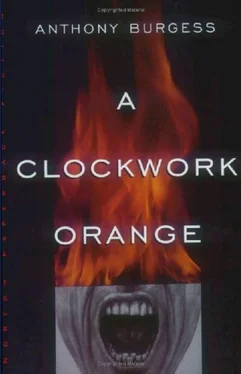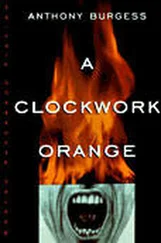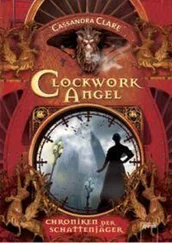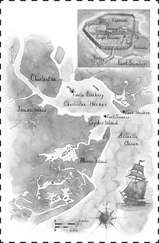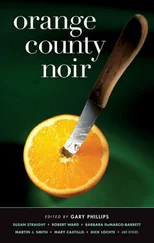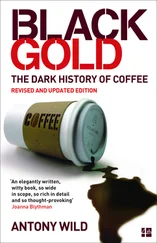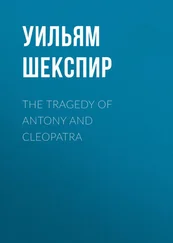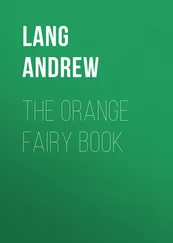“Where out?” said Georgie.
“Oh, just to keep walking,” I said, “and viddy what turns up, O my little brothers.”
So we scatted out into the big winter nochy and walked down Marghanita Boulevard and then turned into Boothby Avenue, and there we found what we were pretty well looking for, a malenky jest to start off the evening with. There was a doddery starry schoolmaster type veck, glasses on and his rot open to the cold nochy air. He had books under his arm and a crappy umbrella and was coming round the corner from the Public Biblio, which not many lewdies used these days. You never really saw many of the older bourgeois type out after nightfall those days, what with the shortage of police and we fine young malchickiwicks about, and this prof type chelloveck was the only one walking in the whole of the street. So we goolied up to him, very polite, and I said: “Pardon me, brother.”
He looked a malenky bit poogly when he viddied the four of us like that, coming up so quiet and polite and smiling, but he said: “Yes? What is it?” in a very loud teacher-type goloss, as if he was trying to show us he wasn’t poogly. I said:
“I see you have books under your arm, brother. It is indeed a rare pleasure these days to come across somebody that still reads, brother.”
“Oh,” he said, all shaky. “Is it? Oh, I see.” And he kept looking from one to the other of we four, finding himself now like in the middle of a very smiling and polite square.
“Yes,” I said. “It would interest me greatly, brother, if you would kindly allow me to see what books those are that you have under your arm. I like nothing better in this world than a good clean book, brother.”
“Clean,” he said. “Clean, eh?” And then Pete skvatted these three books from him and handed them round real skorry.
Being three, we all had one each to viddy at except for Dim. The one I had was called ‘Elementary Crystallography,’ so I opened it up and said: “Excellent, really first-class,” keeping turning the pages. Then I said in a very shocked type goloss: “But what is this here? What is this filthy slovo? I blush to look at this word. You disappoint me, brother, you do really.”
“But,” he tried, “but, but.”
“Now,” said Georgie, “here is what I should call real dirt. There’s one slovo beginning with an f and another with a c.” He had a book called ‘The Miracle of the Snowflake.’
“Oh,” said poor old Dim, smotting over Pete’s shoulder and going too far, like he always did, “it says here what he done to her, and there’s a picture and all. Why,” he said, “you’re nothing but a filthy-minded old skitebird.”
“An old man of your age, brother,” I said, and I started to rip up the book I’d got, and the others did the same with the ones they had. Dim and Pete doing a tug-of-war with ‘The Rhombohedral System.’ The starry prof type began to creech: “But those are not mine, those are the property of the municipality, this is sheer wantonness and vandal work,” or some such slovos. And he tried to sort of wrest the books back off of us, which was like pathetic. “You deserve to be taught a lesson, brother,” I said, “that you do.” This crystal book I had was very tough-bound and hard to razrez to bits, being real starry and made in days when things were made to last like, but I managed to rip the pages up and chuck them in handfuls of like snowflakes, though big, all over this creeching old veck, and then the others did the same with theirs, old Dim just dancing about like the clown he was. “There you are,” said Pete. “There’s the mackerel of the cornflake for you, you dirty reader of filth and nastiness.”
“You naughty old veck, you,” I said, and then we began to filly about with him. Pete held his rookers and Georgie sort of hooked his rot wide open for him and Dim yanked out his false zoobies, upper and lower. He threw these down on the pavement and then I treated them to the old boot-crush, though they were hard bastards like, being made of some new horrorshow plastic stuff. The old veck began to make sort of chumbling shooms—“wuf waf wof”—so Georgie let go of holding his goobers apart and just let him have one in the toothless rot with his ringy fist, and that made the old veck start moaning a lot then, then out comes the blood, my brothers, real beautiful. So all we did then was to pull his outer platties off, stripping him down to his vest and long underpants (very starry; Dim smecked his head off near), and then Pete kicks him lovely in his pot, and we let him go. He went sort of staggering off, it not having been too hard of a tolchock really, going “Oh oh oh,” not knowing where or what was what really, and we had a snigger at him and then riffled through his pockets, Dim dancing round with his crappy umbrella meanwhile, but there wasn’t much in them.
There were a few starry letters, some of them dating right back to 1960 with “My dearest dearest” in them and all that chepooka, and a keyring and a starry leaky pen. Old Dim gave up his umbrella dance and of course had to start reading one of the letters out loud, like to show the empty street he could read. “My darling one,” he recited, in this very high type goloss, “I shall be thinking of you while you are away and hope you will remember to wrap up warm when you go out at night.” Then he let out a very shoomny smeck—“Ho ho ho”—pretending to start wiping his yahma with it. “All right,” I said. “Let it go, O my brothers.” In the trousers of this starry veck there was only a malenky bit of cutter (money, that is)—not more than three gollies—so we gave all his messy little coin the scatter treatment, it being hen-korm to the amount of pretty polly we had on us already. Then we smashed the umbrella and razrezzed his platties and gave them to the blowing winds, my brothers, and then we’d finished with the starry teacher type veck. We hadn’t done much, I know, but that was only like the start of the evening and I make no appy polly loggies to thee or thine for that. The knives in the milk plus were stabbing away nice and horrorshow now.
The next thing was to do the sammy act, which was one way to unload some of our cutter so we’d have more of an incentive like for some shop-crasting, as well as it being a way of buying an alibi in advance, so we went into the Duke of New York on Amis Avenue and sure enough in the snug there were three or four old baboochkas peeting their black and suds on SA (State Aid). Now we were the very good malchicks, smiling good evensong to one and all, though these wrinkled old lighters started to get all shook, their veiny old rookers all trembling round their glasses, and making the suds spill on the table. “Leave us be, lads,” said one of them, her face all mappy with being a thousand years old, “we’re only poor old women.” But we just made with the zoobies, flash flash flash, sat down, rang the bell, and waited for the boy to come. When he came, all nervous and rubbing his rookers on his grazzy apron, we ordered us four veterans—a veteran being rum and cherry brandy mixed, which was popular just then, some liking a dash of lime in it, that being the Canadian variation. Then I said to the boy:
“Give these poor old baboochkas over there a nourishing something. Large Scotchmen all round and something to take away.” And I poured my pocket of deng all over the table, and the other three did likewise, O my brothers. So double firegolds were bought in for the scared starry lighters, and they knew not what to do or say. One of them got out “Thanks, lads,” but you could see they thought there was something dirty like coming. Anyway, they were each given a bottle of Yank General, cognac that is, to take away, and I gave money for them to be delivered each a dozen of black and suds that following morning, they to leave their stinking old cheenas’ addresses at the counter. Then with the cutter that was left over we did purchase, my brothers, all the meat pies, pretzels, cheese-snacks, crisps and chocbars in that mesto, and those too were for the old sharps. Then we said: “Back in a minoota,” and the old ptitsas were still saying: “Thanks, lads,” and “God bless you, boys,” and we were going out without one cent of cutter in our carmans.
Читать дальше
